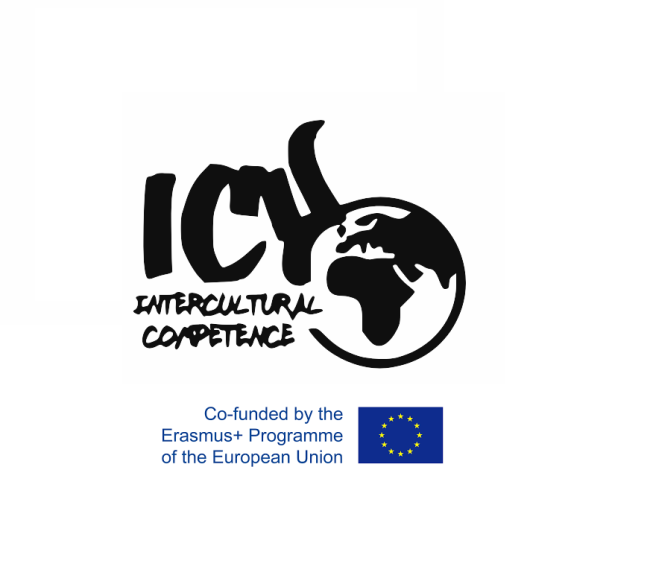ICY Activities for Diverse Youth Groups
[Scroll down for Finnish]
ICY, Intercultural Competence for Youth workers, is a 14-month project (Spring 2019 – Spring 2020) co-funded by the European Union Erasmus+ Programme.
ICY aims to improve social inclusion in youth groups by training youth workers and coaches in intercultural competence.
The four partners (ACSESO from Spain, Changemakerz from the Netherlands, CityPirates from Belgium and HNMKY from Finland) learn from each other to gain best practices in leading youth groups towards cultural awareness. The trainers observe and learn different ways of facilitating social inclusion in the groups.
ICY Toolkit is a compilation of tested activities for diverse youth groups in four categories
a) ice breakers b) energizers c) team building activities d) reflection.
Find the 18 collected activities can be found here in Finnish:
https://pubsecure.lucidpress.com/ICYHARJOITTEET/
*******************
ICY on maaliskuussa 2020 päättynyt Erasmus+ projekti, jossa kehitetään moninaisten ryhmien toimintaa lisäämällä ohjaajien kulttuurienvälistä osaamista ja keräämällä kumppaniorganisaatioiden parhaita käytänteitä harjoituskirjaseen.
Projektin tavoite on lisätä sosiaalista osallisuutta nuorisoryhmissä tukemalla ohjaajien kulttuurisen osaamisen kehittymistä, jotta ohjaajat pystyisivät kohtaamaan erilaisista taustoista tulevia nuoria paremmin ja mahdollistamaan ryhmän toimivuuden.
Kehittäjinä on neljä organisaatiota, ACSESO Espanjasta, Changemakerz Alankomaista, CityPirates Belgiasta ja Helsingin NMKY Suomesta. Kumppanit oppivat toisiltaan parhaita käytänteitä nuorisoryhmien kulttuuritietoiseen ohjaamiseen. Ohjaajat havainnoivat ja oppivat erilaisia menetelmiä sosiaalisen osallisuuden tukemiseen.
ICY harjoitteet on kerätty hankkeen havainnointijaksojen aikana ja niitä on testattu eri kulttuuriympäristöissä. Löydät harjoitteet neljästä kategoriasta: jäänmurtajat, aktivointiharjoitteet, ryhmäyttäminen ja reflektio. Harjoitusmateriaali löytyy suomeksi, englanniksi, ranskaksi, hollanniksi ja espanjaksi.
Toimintamallin nimi
[Scroll down for Finnish]
ICY, Intercultural Competence for Youth workers, is a 14-month project (Spring 2019 – Spring 2020) co-funded by the European Union Erasmus+ Programme.
ICY aims to improve social inclusion in youth groups by training youth workers and coaches in intercultural competence.
The four partners (ACSESO from Spain, Changemakerz from the Netherlands, CityPirates from Belgium and HNMKY from Finland) learn from each other to gain best practices in leading youth groups towards cultural awareness. The trainers observe and learn different ways of facilitating social inclusion in the groups.
ICY Toolkit is a compilation of tested activities for diverse youth groups in four categories
a) ice breakers b) energizers c) team building activities d) reflection.
Find the 18 collected activities can be found here in Finnish:
https://pubsecure.lucidpress.com/ICYHARJOITTEET/
*******************
ICY on maaliskuussa 2020 päättynyt Erasmus+ projekti, jossa kehitetään moninaisten ryhmien toimintaa lisäämällä ohjaajien kulttuurienvälistä osaamista ja keräämällä kumppaniorganisaatioiden parhaita käytänteitä harjoituskirjaseen.
Projektin tavoite on lisätä sosiaalista osallisuutta nuorisoryhmissä tukemalla ohjaajien kulttuurisen osaamisen kehittymistä, jotta ohjaajat pystyisivät kohtaamaan erilaisista taustoista tulevia nuoria paremmin ja mahdollistamaan ryhmän toimivuuden.
Kehittäjinä on neljä organisaatiota, ACSESO Espanjasta, Changemakerz Alankomaista, CityPirates Belgiasta ja Helsingin NMKY Suomesta. Kumppanit oppivat toisiltaan parhaita käytänteitä nuorisoryhmien kulttuuritietoiseen ohjaamiseen. Ohjaajat havainnoivat ja oppivat erilaisia menetelmiä sosiaalisen osallisuuden tukemiseen.
ICY harjoitteet on kerätty hankkeen havainnointijaksojen aikana ja niitä on testattu eri kulttuuriympäristöissä. Löydät harjoitteet neljästä kategoriasta: jäänmurtajat, aktivointiharjoitteet, ryhmäyttäminen ja reflektio. Harjoitusmateriaali löytyy suomeksi, englanniksi, ranskaksi, hollanniksi ja espanjaksi.
Sports clubs, NGO's and youth centers are great places for integration and building social bonds. However, if the leaders of these groups are not culturally competent, the groups may become places where racism, discrimination, or biased treatment thrive. To improve social inclusion in youth groups, it is crucial to support the instructors by giving them the skills and methods to facilitate social change. Youth workers, coaches, and instructors and influencers are role-models and leaders in their groups.
There is a clear need for strengthened cultural competence of instructors engaged in leading youth and non-formal learning groups. This is especially true in our current Europe where immigration issues continue to be an important
focus and discussion point. According to local European authorities and the UN reports, the immigrant population is growing all over Europe. This poses challenges but also provides a good opportunity to implement cultural competence programs for instructors of non-formal clubs and groups. (more data on migration on UN site (http://www.un.org/en/development/desa/population/migration/data/estimates2/estimates17.shtml)
The project’s target groups are youth organizations that use physical and non-formal learning activities partly or fully in their program structure. The activities of the project are meant for youth workers, coaches and instructors of the partner organizations and their collaborators. The young people in these instructors’ groups, however, are the final beneficiaries of the project: as the intercultural skills of the instructor develop further, the instructors can start leading their diverse groups, support individuals within the groups and facilitate integration better.
Kansikuva
